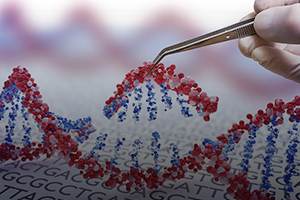CRISPR Caution

CRISPR-Cas9 has been heralded as a powerful tool for repairing genetic mutations. But a recent study reveals that it can have serious side effects when used in embryos.
CRISPR acts like a genetic scissors to remove specific regions of DNA that contain a mutation. A new section of intact DNA can then be spliced in, editing the genetic makeup of the cell. The technique has been used successfully to treat conditions such as hereditary blindness in individual patients. However, when used on embryos, eggs or sperm, where changes are capable of being passed on to future generations, large chunks of DNA were adversely affected, wreaking genetic havoc on the cells and producing serious abnormalities.
A handful of experiments involving human embryos have already been condemned by the medical community, and most researchers agree that the risks of using CRISPR in reproductive genetics are too great.
For information: Dieter Egli, Columbia University Irving Medical Center, 630 West 168th Street, New York, NY 10032; phone: 212-305-2862; Website: https://www.columbia.edu/ or https://www.cuimc.columbia.edu/news/study-identifies-pitfall-correcting-mutations-human-embryos-crispr